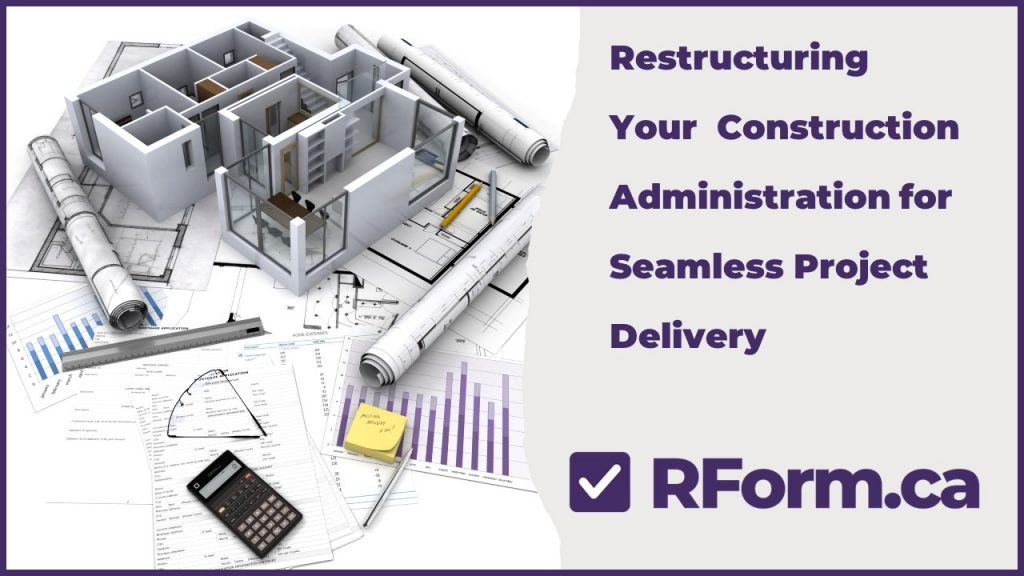
The construction industry thrives on meticulous documentation and efficient communication. Many forms, approvals, and tracking systems ensure projects stay on schedule and within budget, from the initial blueprint to the final handover. However, this intricate web of paperwork can easily become overwhelming, leading to miscommunications, costly errors, and project delays. This is where technology offers innovative solutions to streamline these processes and enhance project outcomes. RForm, a software for construction project management, exemplifies this transformative potential.
While the provided sources primarily focus on RForm’s capabilities in managing RFIs and submittals, they offer valuable insights into how technology can be leveraged to improve overall project administration. This blog post expands on these insights, exploring five key areas where digital solutions like RForm can revolutionize traditional construction workflows.
Essential Forms: The Building Blocks of Project Success
Construction projects rely on standardized forms to document critical information, track progress, and mitigate disputes. Understanding the purpose and impact of these forms is crucial for all project stakeholders.
- Change Orders & Directives: Changes are inevitable in construction projects. Change orders formally document modifications to the original contract, outlining the scope of work, associated costs, and impact on the project timeline. On the other hand, change directives authorize immediate changes to address unforeseen circumstances, with the understanding that costs and schedule impacts will be negotiated later. Effectively managing these changes through proper documentation is vital to prevent budget overruns and maintain project momentum.
- Cash Allowances: Representing a pre-determined budget allocated for specific materials or work packages, cash allowances provide flexibility during the initial project planning stages. However, meticulous tracking of their utilization is essential to avoid exceeding the allocated budget and ensure accurate project accounting.
- Schedule of Values: This document breaks down the total project cost into distinct phases or work items, assigning each value. Acting as a roadmap for payment applications and disbursements, the Schedule of Values is instrumental in monitoring project costs, ensuring accurate payment applications, and maintaining financial transparency.
- Certificates for Payment: These certificates verify the contractor’s completed work and materials incorporated into the project, forming the basis for payment requests. A clear and accurate certification process is crucial to ensure timely payments and foster a healthy cash flow within the project.
Streamlining Processes, Ensuring Compliance, and Minimizing Disputes
The traditional process of creating, submitting, and approving these essential forms often involves multiple stakeholders, physical copies, and manual reviews. This cumbersome approach is prone to errors, delays, and miscommunications, potentially leading to disputes. Technology can significantly streamline this process:
- Centralized Platform: RForm, for example, provides a centralized platform for managing project documents, replacing cumbersome spreadsheets and emails. [1] This centralized approach ensures all stakeholders have access to the most up-to-date information, fostering transparency and reducing the likelihood of misunderstandings.
- Automated Workflows: Digital solutions can automate the routing of forms for review and approval, ensuring timely processing and reducing administrative burden.
- Compliance Checks: Advanced platforms like RForm can incorporate automated compliance checks, ensuring all documents adhere to contract terms and industry standards and minimizing the risk of errors and potential disputes.
Effectively Managing Cash Allowances for Budget Control
Cash allowances offer flexibility but require careful management to prevent budget overruns. Technology offers effective tools for tracking and managing these allowances:
- Real-time Tracking: Digital platforms allow for real-time tracking of cash allowance utilization, providing project managers with up-to-date insights into spending patterns and potential budget concerns.
- Alerts & Notifications: Automated alerts can be set up to notify relevant stakeholders when a cash allowance is approaching its limit, enabling proactive decision-making and preventing overspending.
- Integration with Accounting Software: Integrating project management software with accounting systems streamlines reconciling cash allowance expenditures with overall project finances, ensuring accurate accounting and minimizing the risk of errors.
Utilizing the Schedule of Values for Cost Control & Transparency
The Schedule of Values is a powerful tool for monitoring project costs and ensuring accurate payment applications. Technology enhances its effectiveness by:
- Visualizing Progress: Digital platforms can visually represent the Schedule of Values, allowing stakeholders to track progress and compare planned versus actual costs easily.
- Generating Payment Applications: Software solutions can automatically generate payment applications based on the agreed-upon Schedule of Values, streamlining the payment process and reducing the potential for errors.
- Facilitating Audits: Digital records of the Schedule of Values and associated payments provide a clear audit trail, promoting transparency and accountability in project finances.
Streamlining Submittals for Enhanced Quality Control
Submittals, including shop drawings, product data, and samples, are crucial in ensuring design intent is accurately translated into the final construction. A streamlined submittal logging system is vital for efficient project delivery:
- Centralized Repository: Similar to its document management capabilities, RForm provides a centralized platform for managing submittals, eliminating the need for physical copies and reducing the risk of misplacement or loss.
- Automated Review & Approval: Digital workflows automate the routing of submittals for review and approval, ensuring timely feedback and minimizing project delays.
- Version Control: Tracking different versions of submittals is crucial to maintaining design integrity. Digital platforms simplify version control, providing a clear record of revisions and approvals.
- Real-time Reporting: RForm’s real-time reporting capabilities allow project teams to track the status of submittals, identify potential bottlenecks, and ensure timely reviews.
Embracing Technology for Enhanced Project Outcomes
The construction industry is undergoing a digital transformation, and embracing technology like RForm is no longer optional but essential for remaining competitive and delivering successful projects. By streamlining processes, improving communication, and providing real-time insights, digital solutions empower construction professionals to navigate the complexities of project administration with greater efficiency and accuracy. From managing essential forms to streamlining submittals and tracking cash allowances, technology offers a path toward enhanced project outcomes, reduced risks, and a more successful and profitable construction experience.
The RForm Advantage
- Centralized Document Management: RForm provides a single platform for organizing and accessing project documents, replacing scattered methods like Word and Excel, ultimately streamlining collaboration and decision-making.
- Automated Compliance and Reduced Risk: The software automates compliance checks within contracts and documents, minimizing errors and potential disputes. This, along with advanced features and risk mitigation measures, offers peace of mind and protects firms from liability.
- Canadian Construction Focus: RForm is designed for the Canadian market, incorporating local construction regulations, practices, and contract standards for seamless integration.
- Streamlined Workflows and Communication: Automated workflows for tasks like RFIs and submittals save time and reduce errors. A centralized location for project documents fosters better communication and minimizes misunderstandings.
- Enhanced Security and User Control: RForm prioritizes data security with strict protocols. Users can control their data preferences and opt out of specific features, ensuring privacy.

